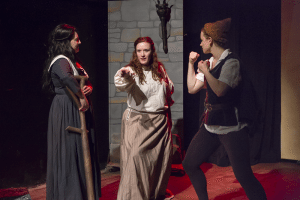
 There is a new verse play in town written entirely in iambic pentameter with 30 characters played by 10 actors who all happen to be women. Ego Actus presents award-winning Duncan Pflaster's "Tragedy of Dandelion", now playing at Urban Stages.
There is a new verse play in town written entirely in iambic pentameter with 30 characters played by 10 actors who all happen to be women. Ego Actus presents award-winning Duncan Pflaster's "Tragedy of Dandelion", now playing at Urban Stages.
We caught up with Pflaster to discuss the play's themes, the confines of writing in iambic pentameter, and how this play differs from some of his previous work to date.
StageBuddy: What inspired you to write an original play in iambic pentameter?
Duncan Pflaster: I had written a few plays partly in iambic pentameter before, with it being an element of certain characters (royalty or lovers, for example), but had never written a full play entirely in verse before (now working on one in rhyming couplets). There’s a strange effect when constraining yourself to verse, it forces a writer to stretch in other ways and I think enriches the language.
SB: How does having an all female cast best serve the play?
DP: As the play is, in part, a criticism of the low value of women in Shakespeare’s time, it was a nice chance to turn on its head the tradition of all-male casts from his era. Also I know tons of brilliant actresses; since so many performers in New York are women, the female actors really have to strive to be the best of the best, and it’s great to let them shine in meaty roles.

SB: What themes are explored in "Tragedy of Dandelion"?
DP: Oh, the usual; gender politics, religion, war, basically the abuse of power. Also taking charge of one’s own life, and not letting your circumstances dictate how you live.
SB: Which character in the play are you most like?
DP: Totally Josser, Queen Alice’s Jester. I consider him the third lead of the play. He’s constantly cracking terrible jokes and coming out with witty puns, but though he sees it as his job, he can’t resist a good opening.
SB: Besides the Shakespeare verse, how is this play different from your other work and what's the biggest thing you've learned seeing it in production?
DP: A lot of my other work deals with more explicit sexuality, while this one is about more general power dynamics. This one has swordfights and more opulent costumes, and an all-female cast.
Playing at Urban Stages May 28-June 8th